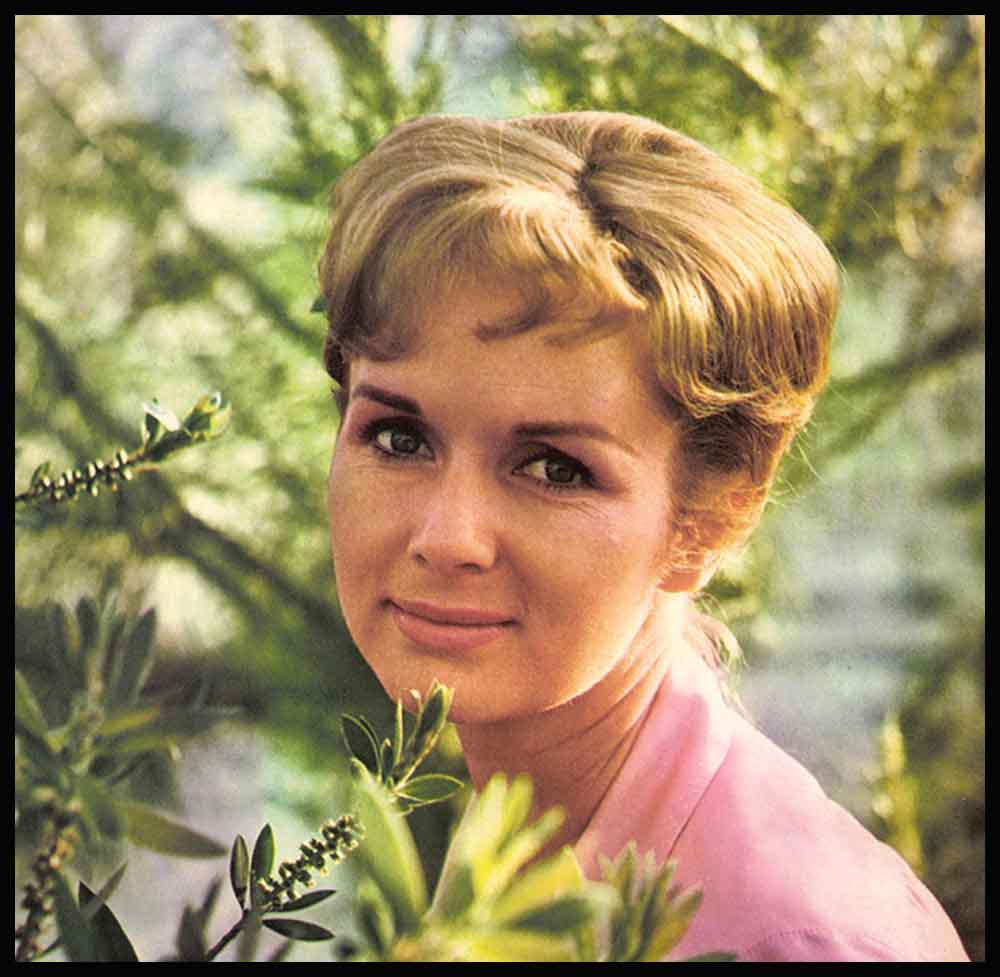
Happiness Is A Guy Named Harry
You don’t have to look into a crystal ball to know Debbie Reynolds Karl is happy. Her own radiant serenity tells the full story.
“Our love is very fulfilling,” a glowing Debbie told me. “Harry is a really wonderful man, a mature man— and he fills my needs in every way.
“Not only is he a wonderful husband—which, of course, comes first—but he’s also a wonderful friend to my children—which is about on an equal par with being a wonderful husband really, you know.”
Marital adjustments? Problems? These words are nonexistent in Debbie’s life today.
“With Harry’s wonderful attitude,” Debbie says, “we just don’t have any problems at all. And I’m a very flexible person, too—perhaps through experience. . .
“There are no problems with our families. The in-law problem, which could be a very severe problem, doesn’t exist in our marriage. I’m very fond of his family and Harry’s extremely fond of mine.
“The children knew Harry for a year before we were married, and they’ve always loved him. They wanted him to live with us a long time ago,’’ Debbie says with a smile, “but I explained to them that there are laws— and we had to get married first.
“Harry is a giver” she says warmly. “Of himself, I mean. He’s a completely unselfish man. Even when we were going together he never asked me to go anywhere without including my children. And that’s the sign of a very mature man, because he was attracted to me individually.
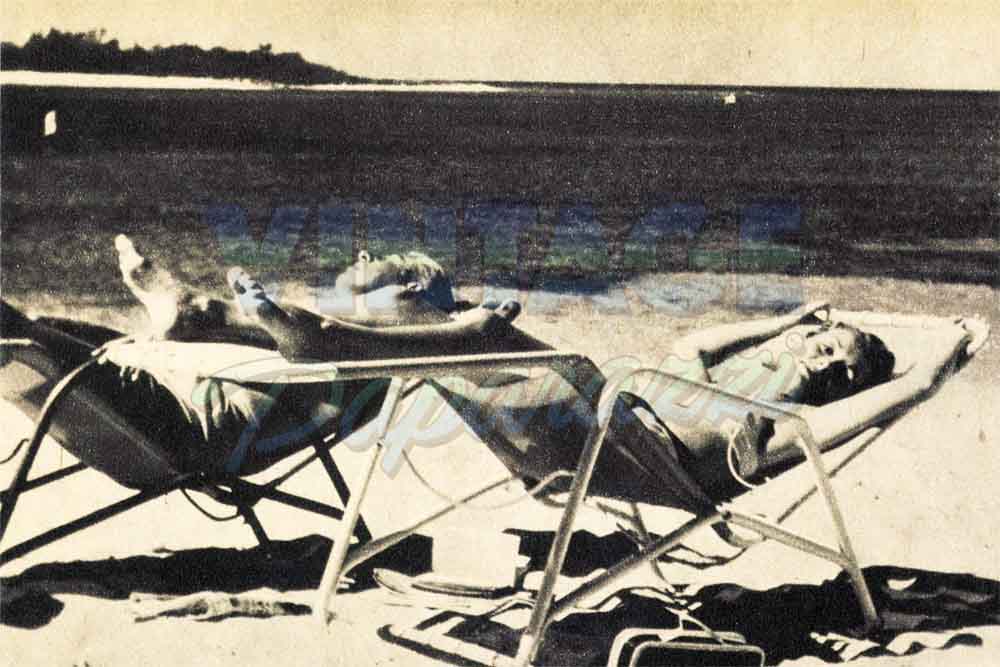
“Whenever Harry plans anything now, it’s for all of us—as a unit. He doesn’t think Just himself or of what he might want to do, he thinks of what would be good for Carrie and Toddie and me.”
As a reporter-friend who’s known her since she was 17, I have no doubt that today, for Debbie, happiness is a guy named Harry.
As she told me, “We share so much—besides our deep love for each other. We have a good marriage. There are just no problems at all. . .”
This, despite some Hollywood handicappers who’d warned so grimly about how Harry’s wealth would be no substitute for happiness.
As I knew it wouldn’t, her marriage has made no change in Debbie’s way of life. The only difference I could see was the pear-shaped diamond engagement ring that weighted down her left hand. With it she was wearing a simple brown cotton shirt, open at the throat, and a brown plaid wool skirt. And, typically, she’d stashed her shoes under the coffee table by the over-sized green couch in the den, and on her feet Debbie was wearing only a deep Jamaica tan.
Debbie always removes her shoes whenever she can. Harry Karl once laughingly conceded that this habit of hers was the world’s worst advertisement for his business. Since marriage, Harry’s been rapidly adjusting to the fact that there’s small likelihood of the shoe business improving—at home.
The phone rang, and Debbie bare-footed it across the den to talk to her husband about another meeting with the architects to go over the final blueprints for the new Karl home being built in Beverly Hills.
Since their return from Jamaica, life has revolved around the blueprints, with a maze of lines and squares and figures that will one day add up to their dream house.
“Neither Harry nor I have ever built a house before. And it’s a JOB to build a house you plan to live in the rest of your life.”
No problems? As we talked (this was Debbie’s first interview since returning from their vacation and delayed honeymoon), the phone was ringing constantly with some matter for Debbie’s decision. Mrs. Karl was up to the top of her cute blonde bouffant hair-do in problems. But none of them came under the heading of Harry.
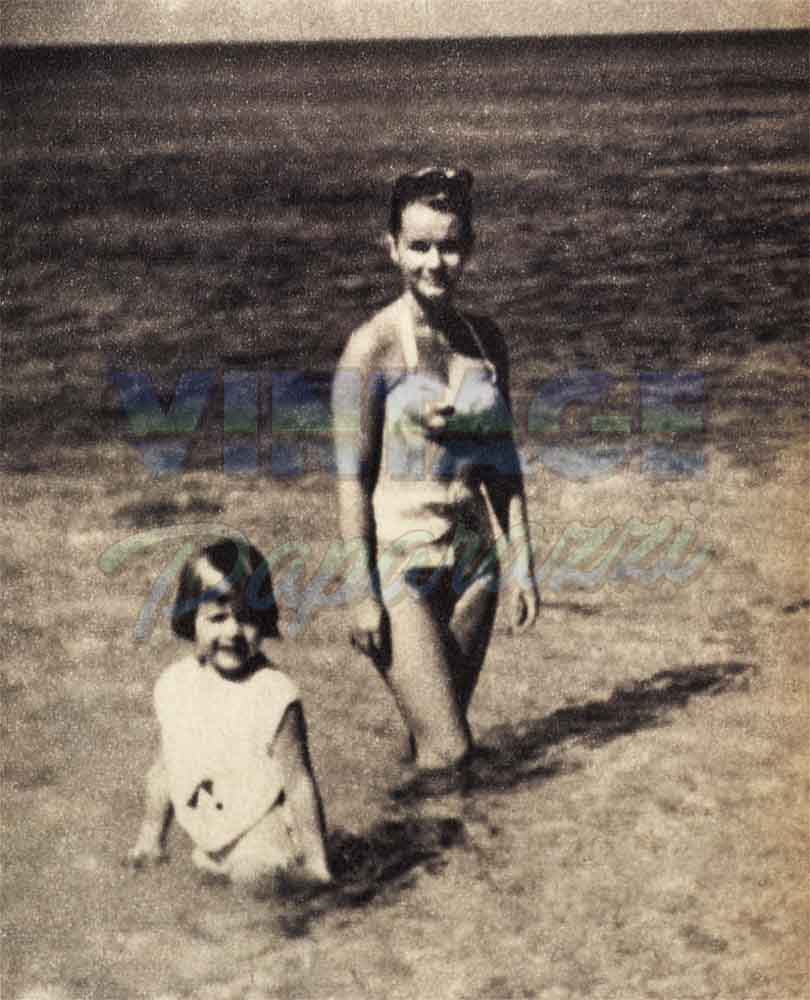
Debbie was without a cook, and the agencies were calling to set up appointments for her to interview prospective chefs. In addition, she was expecting Harry’s mother and stepfather and her own parents and grandmother for a Mexican dinner that evening. Her mother, Maxene Reynolds, was bringing the dinner—fortunately. “My mother cooks the greatest Mexican food! Harry and I have been dying for some,” she said.
Debbie was also in the midst of arranging a West Coast fashion show for her Debbie Reynolds Originals. Swatches of materials and designs were arriving hourly for her approval before they could be made up for next season’s line.
Seven children in Carrie’s class in school had the measles “and it’s the twelve-day measles, not the three-day kind,” Debbie worried. “Carrie had a little temperature for a few days, but nothing has come of it . . . yet.”
Furthermore, the city had declared open warfare on Debbie’s block in Holmby Hills. They were repairing the Street and really blasting up a storm outside. From the sounds out front, they were bringing up their heaviest artillery right under the windows where Toddie and Carrie were having their afternoon naps.
As if on cue, an awakened drowsy-faced little doll came into the den in her red and white pajamas. Debbie took Carrie on her lap and smoothed her hair tenderly. “Did you sleep any, Baby?” she asked hopefully, feeling her warm head. “Did you have pretty dreams?”
As for Debbie’s dream-house, the problems there were just beginning. “We’re just selecting the woods and the flooring and the exterior—nothing interior yet,” she said. “We’re still in the planning stages really. It takes a long time to plan a house because you don’t want to make any mistakes. At least you try not to make any—that certainly doesn’t mean we won’t. Harry’s always purchased his houses and I’ve either rented or bought, so we’re both rather new at the building game.”
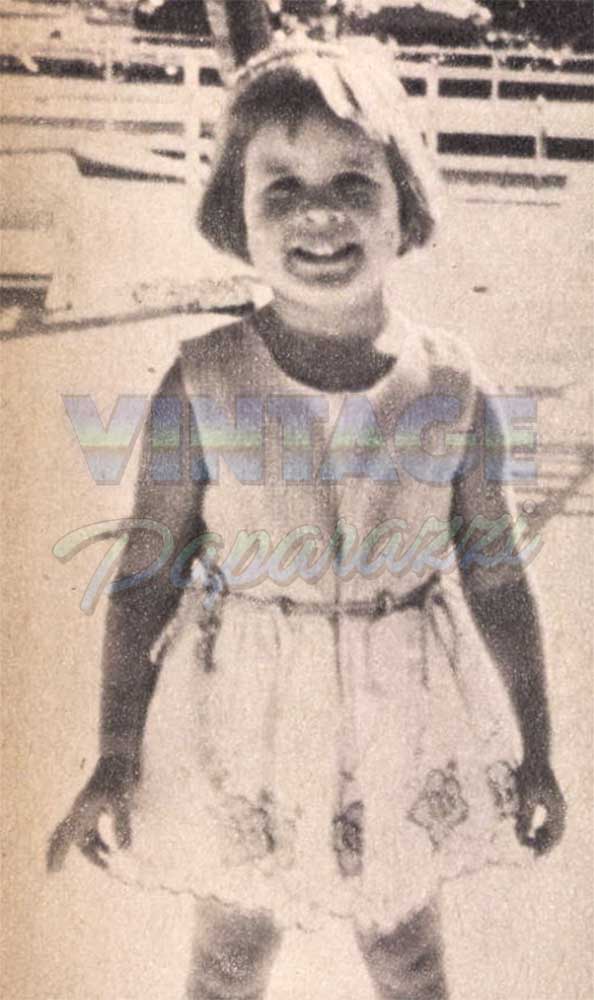

The house, which Debbie describes as “an English country home with a contemporary feeling,” will be built on the two- acre lot they bought some time ago on a palm-lined Street near the Beverly Hills Hotel. With a few variations it will be— finally—the dream-house Debbie’s been planning since she was 17.
“I’ve always liked English country houses, but ours will be one-story and a little more contemporary than houses I used to look at. It will have the warmth of an old English house, but instead of red brick we’re using blonde stone. I like an airy house, so ours will be very open and almost modern, as far as the windows and the back exterior are concerned.
“And Carrie’s going to have a pretty bed- room in the new house,” Debbie said. “Aren’t you, Baby?”
And therein lies one of her biggest problems in planning a dream-house for four . . . forever! As Debbie and Harry worked their way through the blueprints, they had to en- vision the children as teenagers and plan the house so it could fill every lively need of their growing years.
As Debbie said, “Harry and I’ve planned to live in this house forever. So we have to plan for now and for the future. We must decide how big the rooms should be, how large to make the play-yard and the pool— or whether we even want a pool . . . we still haven’t decided about that.”
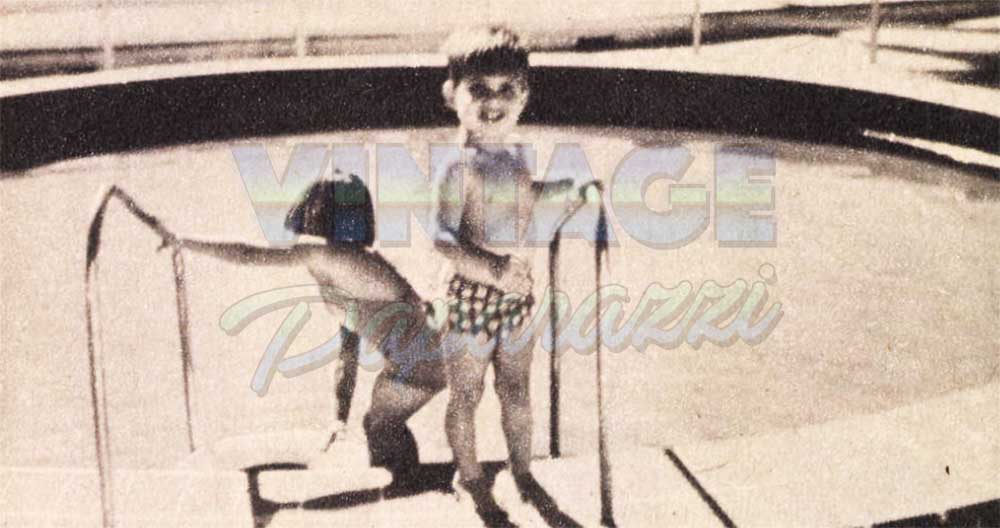
Somewhere within the blueprints Harry’s already lost a planned steam room, and Debbie’s and Carrie’s closet space has expanded considerably. “We ruled out a steam room for Harry because he goes to the club anyway,” Debbie explains. “And we’ve ruled out a few other unnecessary things.” But they haven’t ruled out dressing rooms. “Harry will have a spacious dressing room and I’ll have a huge one because I never have enough room for anything.
“But the whoIe house will have lots of closet space because I’ve found that no house ever has enough. l’m such a saver— I save everything.” Debbie smiled, as she quickly looked in the direction of her old French horn, a memento from Burbank High, which has a special niche in the den. And, she also revealed that somewhere upstairs—in a crowded closet—were the uniforms she once wore at Girl Scout Camp.
It will come as a surprise to those who stressed that Karl’s millions were what attracted Debbie, to learn that her dream- house will be small enough for Debbie to take care of herself.
“I don’t want a big house,” Debbie said. “Just a lovely functional home—probably with four bedrooms. I want to be able to take care of our house myself if the help should walk out one day. I don’t want to feel I could never run our house without help. My mother always ran her house without anybody, and there’s no reason why I shouldn’t be able to do this with our home, if need be.
“I’m not going to live any more elaborately than I have been,” Debbie went on. “I’ve been working since I was a teenager, and financially I’ve been able to live more or less as I’ve wanted to for years. And l’m living the same way now. That’s the only way I want to live. I don’t care to live any differently.
“I’ve always been a saver,” adds Debbie. “That’s the way I was raised, the way I am and how I’ll continue to be. I’m not a spend-thrift and neither is my husband, contrary to some articles that have been written.”
Debbie and Harry intend to start their own family “in about two years.” But there couldn’t be a warmer relationship by blood than that which exists between Harry and Carrie and Todd.
After their marriage, Debbie and Harry held a miniature wedding ceremony at home so Carrie and Todd could understand marriage and feel they were part of the whole thing.

“We played ‘Bride And Groom,’ in the living room. We explained to them Mommy was the bride and Harry was the groom, and they stood in for us. Carrie wore a veil and Toddie walked with her and Rudi (Debbie’s accompanist and secretary) played Here Comes The Bride. To the children it was fun and wonderful and warm. They were very excited about it.”
It was Harry who insisted Carrie and Toddie join them in the Caribbean on their delayed honeymoon. As Debbie said, “A week is about as long as I can be away from the children—then I miss them so terribly I just have to be with them. And Harry is the same way.”
Carrie and Toddie, for their part, were thoroughly enchanted with the whole idea of flying to Jamaica to join their mommy and Harry—until they discovered there was no television there and they couldn’t keep up with Captain Kangaroo.
Toddie had been impressed with the ad- venture of it ali, even including being inoculated with a large shot of gamogloblin beforehand, “to protect him against hepatitis or malaria or a fever of any kind,” Debbie explained. Proud Todd would happily teli everyone, “The doctah gave me a candy sucker and then he stuck me—SEE?”—and he’d bare a hip for closer inspection.
An excited Carrie and Todd arrived safely in Jamaica with Maxene and Ray Reynolds. Toddie brought his favorite toy, a screwboard and some screws. Carrie had a little suitcase full of toys, and she was carrying “Angel,” her beloved doll.
The children walked into their room at the hotel, looked all around the room, then turned startled eyes to their mom and asked, “Where’s the television?”
“They watch television an hour a day at the most here at home,” Debbie says. “They watch Captain Kangaroo in the morning, and sometimes they watch cartoons like Pop Eye in the evening. We explained they didn’t have television in the Islands, but they had the beaches and the sunshine and that we all could have a grand time looking for sea shells.
“Then, suddenly, out of season, the rains came—and came—and came!
“It poured for two straight days—well, it hurricaned really,” Debbie recalled. “The wind was so terrific we couldn’t go out of the hotel because we’d get knocked right over. We had to eat in our rooms, because the dining room at the Half Moon is outside. The children couldn’t leave their hotel room for two full days.”
In those two days Debbie gave the performance of her life—supported by Harry. “We played everything—but there are only so many things you can play,” she laughed. “We acted out every fairy tale we could think of, we played every game, sang every song, read every book and even took three baths a day. We played ‘house’ with them, making a house by turning the chairs over and putting the bedspread over the chairs. Then they got tired of that, too. Harry and I were really ready for television.”
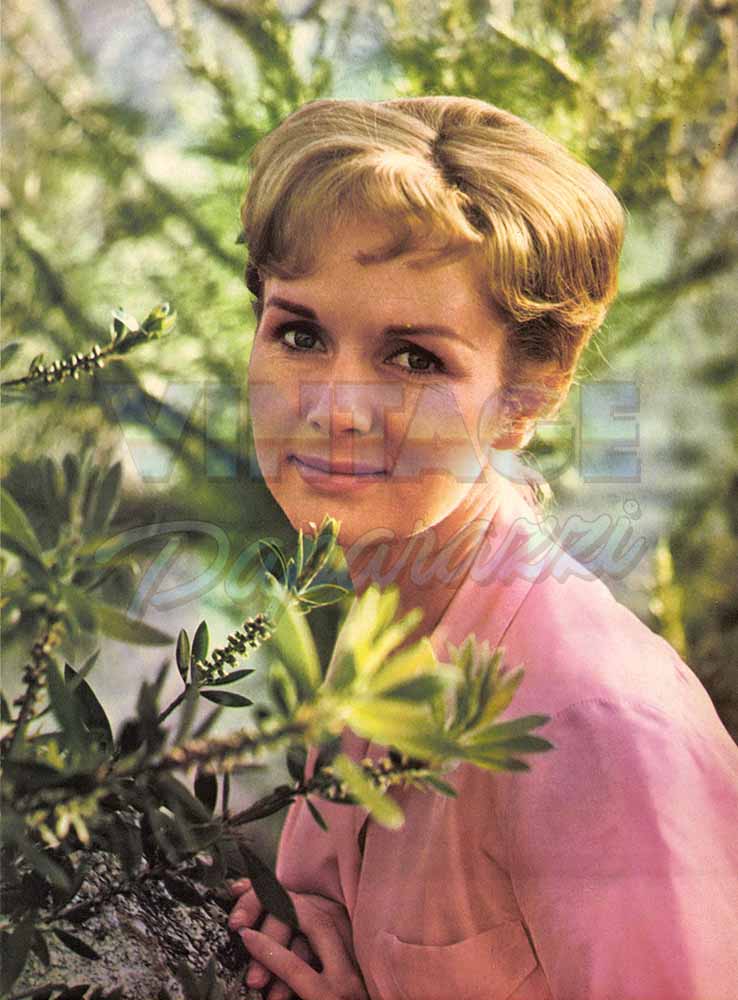
But when the rains stopped, the island became a paradise.
Debbie and Harry learned to master a paddleboat, with an excited Carrie and Todd riding in the rumble seat. They went deep-sea fishing with her dad one day. “Harry isn’t much of a fisherman and I don’t like to fish at all,” admits Debbie. “We just went along to keep my father company.”
But they spent most of their time playing with the children on the beach in front of the hotel, sunning themselves in contour chairs and helping Todd and Carrie dry out sea shells and other treasures they found on the sand.
When the sun went down, Toddie would ask, “Where’s Pop Eye?” And it was Harry who finally suggested to his bride, “Let’s go back to Florida where the kids can have TV.”
“We had a wonderful time in Miami Beach but Carrie finally wanted to come home to her ‘very own little bed with the ruffles,’ didn’t you, Baby?” Debbie asked as she kissed her daughter.
Whenever they’re away from home, Carrie’s always anxious to get back to her little white four-poster bed with the white organdy canopy and the organdy ruffled bedspread which her grandmother made for her for her birthday.
Toddie always yearns to return home, too, but for a different reason—he misses his carpenter’s bench. Todd’s ambition is to be a carpenter like Debbie’s father. At home Toddie’s a very busy little man with his screwdriver—removing brackets, light switches or anything else he can.
And when Harry noted his bride drawing floor plans in the sand, he knew Debbie would be happier back home building their dream house. They’re all happiest at home— Harry included.
“A more wonderful husband, or father, or homebody, you couldn’t find,” Debbie says happily. “There have been remarks in some stories about Harry that are completely unwarranted, untrue and ridiculous. They’ve even said Harry’s a playboy. Well, we go out very little—we’re always home. No husband could be more of a homebody.”
And nobody could be happier about it than Debbie.
Todd and Harry usually begin the family’s evening together by having “a small one” in the den when Harry Karl gets home from the Office.
This is a custom that jolted the natives in Jamaica. One afternoon they were ordering cold drinks and, as usual, Carrie ordered a “Shirley Temple.” “I want a martini,” ordered Todd, without batting an eye. His mother hastily explained that a “martini” was a Seven-Up with either an olive or a cherry.
Debbie and Harry usually have dinner with the children, and their favorite evenings are spent playing with Carrie and Todd. “We play records and dance with the children, or we bang on the piano or some- thing,” smiles Debbie.
Sometimes Carrie performs. She’ll sing a French song like Ainsi Font Les Marionettes —which her mother has difficulty pronouncing. “Carrie speaks the French, I don’t,” she laughed.
“Carrie knows a number of little French songs,” Debbie said proudly. “They speak French in school. They start them at this age. and it’s amazing! She knows about sixty words in French now. I wish I’d taken French when I went to school. It’s so important to know foreign languages—the way the world is shrinking today.”
And it’s imperative to know them at home —if there’s going to be complete togetherness. Carrie’s been teaching a few words to her brother, and now Toddie’s speaking a little French, too. Debbie’s French housekeeper, Yvette, is helping them along, teaching them additional words. Now Carrie and Todd speak only French at the breakfast table. Yvette chatters to them in French about their food, and they ask for what they want in French. Debbie and Harry feel pretty much out of it.
“Harry and I are going to start taking French lessons now,” Debbie revealed. “Yvette’s going to give us lessons three times a week, and we’ll speak only French in the house. That’s the only way you can learn.” And she adds, “it should be a very interesting house.”
Debbie speaks with warmth and affection of Harry’s children by a former marriage, and of her hope that all the children can have a family closeness as time goes on.
“Harry has four children, and we see them as much as possible,” Debbie said warmly. “That’s a broken home also, and naturally one parent doesn’t see the children as much as he’d like to—but we do see them. He has a wonderful little boy, Harrison, and a very sweet little girl, Dee Dee, who are ten years old. They’re wonderful children, and Carrie and Toddie are crazy about them. Then there’s Tina, who’s the same age as Carrie, and his grown daughter, Judy. I hope the children will all grow closer together as the years go by.”
Debbie’s children are devoted to Harry’s mother, Rose Rubell, whom they affectionately address as “Grandma Rose.”
“We have a warm and full life together,” Debbie said seriously. “We share so much besides our own deep love for one an- other.”
They’re both fighting fans of the Los Angeles Dodgers and mad about baseball. “I love tennis, and we’re going to start playing tennis together,” Debbie enthused. The one sport they don’t share is golf.
“Golf is Harry’s main game, and I’ve never taken it up, really,” she says. “I’ve never had time. It’s a very difficult game and you have to play every day if you’re going to learn. It’s so involved—how to putt, whether to hit with this iron or that wood, and so on. I’m going to take up golf when I have time—which may never be,” Debbie laughed.
They share an interest in art, although as Debbie said, “We’re just starting to collect pictures—neither of us has ever been too versed on art.” They both love music, and they’re both musicians—in a manner of speaking. “Harry used to play the trumpet when he was a young boy, and I used to play the French horn,” laughed Debbie, “so there’s common cause there!”
For all the grim warnings voiced and written about their age difference, Debbie says there’s no problem there.
“As far as the actual age difference in years—what are years?” a serious Debbie asked. “Age difference can’t be applied to everybody. I feel a man doesn’t have to reach a certain age to mature. Some men mature young; some women mature young. And this business is great in helping a girl mature very young.
“If you re in this business—and I’ve been in it since I was sixteen—you’re with older, more mature people, and you’ve had to grow up faster. I found it very stimulating— but very hard.
“As a young girl you’re associating with men in their fifties and sixties or seventies, and with women who are like thirty, forty, and so on. They’re far more intelligent than you and they know miles more than you know. But the fact that you’re with them every day gives you an incentive to learn. And you do learn because of these people— and from these people.”
And as you learn, Debbie said, the age difference diminishes.
In the same vein, there’s no problem adjusting to Harry’s life or to his friends.
“I’d already met most of Harry’s friends through one friend or another. I’d been with them and at the same parties. I didn’t know them perhaps as well as I will know them now,” Debbie added. “We haven’t had time to have any dinner parties or have any friends over yet, or anything like that. But as time goes on, I hope to form our own circle of friends. Married people always do.”
One thing is certain, Debbie has no intention of allowing her career to interfere with her personal life—or their personal happiness. “I won’t be as active in my career as I have been the last two years. I’ll still make two pictures a year, and that’s plenty. I wouldn’t think of making a movie on location or of being away from my family. I just won’t do that.
“When I was married to Eddie I worked very little, as you’ll remember,” Debbie continued. “I wouldn’t take locations then. I don’t believe it’s possible to be separated and have a marriage. Not for me, anyway. I’m completely unhappy without my family, and it’s ridiculous to consider working away from those you love—when you have that emptiness.
“Harry and I have a good marriage,” Debbie said radiantly. “We just don’t have any problems.”
Debbie Reynolds has found happiness with a depth and security she’s never known before. For Debbie today, tomorrow and always, happiness is a guy named Harry.
—BY MAXINE ARNOLD
It is a quote. MOTION PICTURE MAGAZINE JUNE 1961




